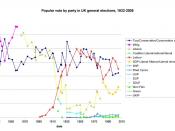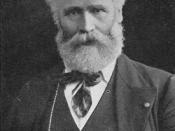Why did the Labour Party rise so rapidly from having only 29 MPs in 1906 to forming a government in 1924
The Rise of the Labour Party or to be more precise its birth is seen as a very complex issue. However Pelling gives us some idea as to how it came to being. He argues that it was because of the "enfranchisement of the manual workers in 1867 and in 1884 tended to increase the electoral importance of "labour" and its leaders. However he argues that this factor cannot be only reason as it not enough on its own. It is argued by Pelling that there growth was partly due to the "various social and economic changes" (1) that took place in the later nineteenth century "leading in the direction of a greater solidarity solidarity of manual workers". The weakening of the religional and religious characteristics of the country is seen as playing a vital role in the rapid rise of the labour party.
Early influences were very important in bringing birth to the labour party and later helping the party form a government. The education Act of 1870 separated the population. The concept of a "middle class" and a "working class"(2) began to develop. Although this may not have helped the Labour at the time it did help them in the later stages as they were seen a working class party. The forming of the trade unions, the Social Democratic Federation and the Socialist League were all very important as they grew in the later stages to help the Labour Party to form a government in 1924.
In 1906 the Parliament assembled, the L.R.C. assumed the name of the "Labour Party", it consisted of 29 MPs in parliament. The Labour Party had come this far as a result...


